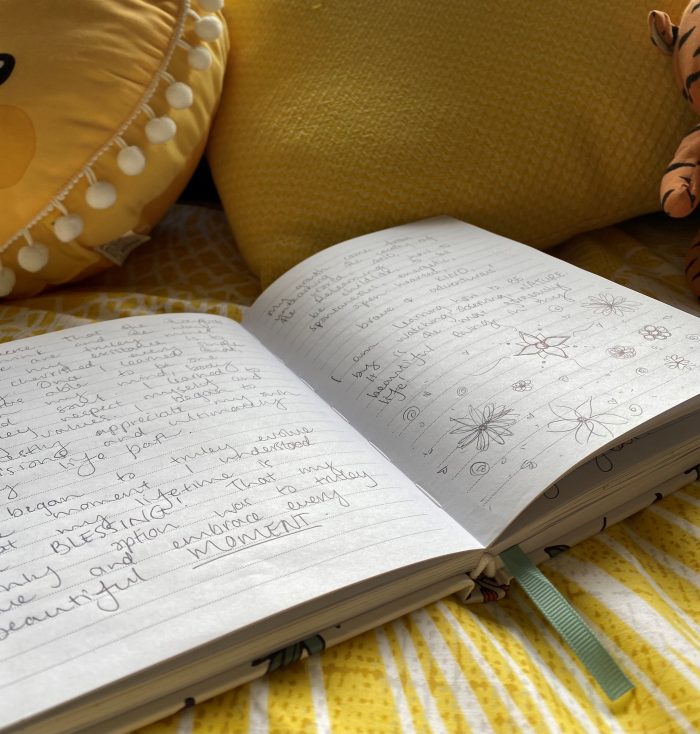You’re here because you want the answer to the question: how to journal?
Most days, I sit myself down in a comforting place with the sun shining her gorgeous rays down onto my skin, and I write about everything.
It soothes my being to have my hand scribble across the pages as I embrace my surroundings—the slight breeze against my face, the birds singing happy songs nearby, the tree branches dancing so enchantingly to the wind’s rhythm.
I find everlasting peace in a task so simple, and I want you to know how to do the same.
Writing is an incredibly calming experience and one that is unique to us all. There really are no rules or guidelines when it comes to journaling—only that it should be done with kindness, love, and the purest of purposes.
However, I understand that the hardest part about it is starting. And stressing over what to write about can take the joy out of such a wonderful task. The truth is, journaling should never be stressful. If you’re finding this to be the case, try sitting down and dedicating some time when you don’t have commitments. And if you’re still feeling overwhelmed, remember it’s okay to try again another day.
So if you’re struggling to get started (or if you just want some tips), here’s a little guide that may help you on your journaling journey:
Begin your journal entry with kind words.
When we are gentle to ourselves and our situations, it is easier to speak our truth and write from our hearts. For instance, if you are having a particularly hard day and are feeling a little melancholy, begin your journal with an affirmation or a loving phrase.
Here are just a few that I use: “Good morning, my darling girl,” “I am proud of myself today for…,” “I am terribly grateful today because…,” “My gorgeous darling…”
Speak your truth.
Express the things on your mind no matter how silly you think others will perceive them. Always try to write about how you feel in the present moment and then unpack the possible reasons as to why you feel this way.
Try speaking in the third person.
I find this particularly useful when I’m struggling and need to find solutions. To be able to step outside of the chaos that’s happening within your mind, to look at your situation from a new perspective, and offer advice to yourself is so incredibly powerful. Examples of this third-person talk is using your name, using words such as “you” instead of “me,” and describing things as if someone else were speaking about them.
Don’t rush the process.
When you find yourself searching your brain for things to write about, it’s usually a good indication you don’t need to.
Be grateful.
Always, always make time to be grateful. It’s really easy to begin writing about something that is frustrating you or making you sad, but remember to step outside of that point of view—just for a moment—and find appreciation within these hardships. Transition into the third person, and tell yourself how extraordinary it is to feel your emotions and exist in such an astonishing world.
End your journal entry with sentences filled with love.
I find this to be the most powerful thing about journaling because it allows us to end our writing feeling peace, love, and accomplishment. By filling that last paragraph with passion, we encourage ourselves to continue to intentionally choose growth and the uncomfortableness that coincides with evolving.
For me, I always end my journal entry with “I love you, Shanaye,” as well as other words of affection and comfort. If you make it a habit to end your writing with such passionate words, you will find that it brings so much peace to the rest of your day.
Please remember that these are ideas. There certainly isn’t one way to journaling. Fill your pages with all that your heart desires—with drawings and scribbles, with love hearts and stars. Be intentional with it, use it as a tool for growth and prosperity so that positivity flows.
Why we need to be journaling: I use the term need in the most deliberate of ways. Journaling is an enlightening experience; it is eye-opening and allows us to find courage and strength within ourselves. It is not something that should be chucked on our to-do list in hopes that it will add something to life; it is intentional.
Here are just 10 reasons why journaling is important:
1. Provides a safe space.
Over the recent months, I have greatly understood why having a space where we feel most at home is so important. The term safety is defined as “the condition of being protected,” and thus, when we feel safe, we are able to focus more greatly on our own existence.
When we feel safe, we are able to fulfill our potentials and spread love and kindness to all that crosses paths with us. I believe a journal should be written for us, and only us, as knowing no other will read its pages allows us to be comfortable enough to write our fears, dreams, thoughts, and wonders.
Having a safe space in the form of a journal allows us to accept ourselves for all that we are and, in turn, leads us down the path of unequivocal self-expression.
2. Confidence and self-expression.
Journaling allows us to freely tell our stories and our troubles—a skill that leads to having more confidence in ourselves and therefore a greater ability to be our truest, most authentic being.
When we are able to write down our emotions onto a page, we are giving ourselves permission to feel them and the capacity to soon overcome them.
3. Self-discovery and personal growth.
When we journal, we may find ourselves scribbling down things that we had no idea we even thought about—wonderful things that make us stop writing and think to ourselves, “Wow, I really am proud of the person I’m becoming.”
As I said previously, a safe space allows us to write, think, and feel everything that we need to. And so journaling allows us to overcome situations in a way that forces us to grow and discover new and beautiful things about ourselves.
4. Allows us to work on triggers and childhood trauma.
Again, this is related to having that safe space where we can go to express our dilemmas. We use our journal to note down certain triggers we have and the trauma that lives within us from our upbringing. Writing with kindness about how sometimes we may not be the kindness of people, or the struggles we still face because of how we were raised, allows us to address them and heal from them.
5. Clears the mind to allow for solutions.
Writing our thoughts and feelings down with a pen in hand really does clear our minds and provides the space we need to effectively find solutions. When we journal about something difficult we are experiencing, we are then able to continue writing about possible answers that will solve the issue at hand.
Not only is this good for our mental health, but being able to problem-solve through writing allows us to develop the ability to solve challenges that arise in real time, therefore reducing the amount of time we stress about the issue before we write it in our journal.
6. Relieves stress.
Similarly to solving problems we face in everyday life, journaling frees up the space we hold in our mind where our stress gremlins live. To regularly jot down all that is worrying us clears our mind and frees our heart and soul of the stresses that hold us back.
This practice of journaling our stresses will empower us to fill that space with tenderness and become the free-spirited pixie that we are.
7. Gratitude.
Gratitude will forever change us, and intentionally writing down what we are thankful for and why we are thankful for it opens our soul to the wonders of this world. Being grateful allows us to find beauty in things even when we are struggling or having a hard day. This act of writing all that we are appreciative of makes it easier for us to resurface from a place of darkness as well.
8. Changing our way of thinking.
When we journal in a way as I described above in the section How to Journal, over time, our kind and love-filled words will change the perspective we have on our life. Personally, I grew up having a negative attitude toward all that crossed my path. In spite of this, I journaled, and I wrote about all that I was thankful for and all the worries I had.
To write in such a compassionate way to ourselves and for ourselves really does change our perspective on the world, and we realise that it isn’t such a hard place and that we have the power to be kind when the world is not.
9. A way to remain present.
Staying in the moment is a difficult task. By writing down our fears and worries (generally, they have something to do with our future or past), we make room for ourselves to just be. We are able to solve the problems at hand and sit with ourselves in the moment and be grateful for all that we are surrounded by.
Remaining present in our own life is a crucial part of our happiness; we don’t focus so intently on the things that could go wrong but rather on all that we have right now.
10. Love and kindness.
When we write with love and kindness, we fill our soul with love and kindness; we bring this to the world simply by existing. It is important that we are compassionate to all that find us.
Ultimately, journaling is a practice that has the potential to change our way of living. To express our true self within the pages of a journal leads to wonderful solutions, stress-relief, true authenticity, and a shift in the way we perceive ourselves and the surrounding universe.
However, we must journal with the purest of intentions—the intention of becoming a better version of ourselves every single day. We must journal with kindness and with love so that it brings peace to our soul and then to our existence. Read more about the benefits of journaling here.
I wish you the most glorious journaling journey.
~









Read 3 comments and reply